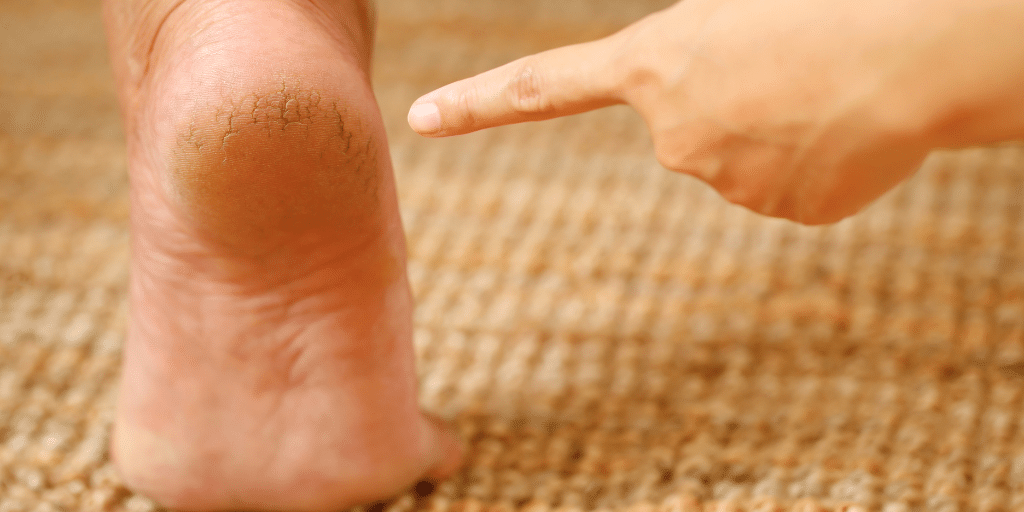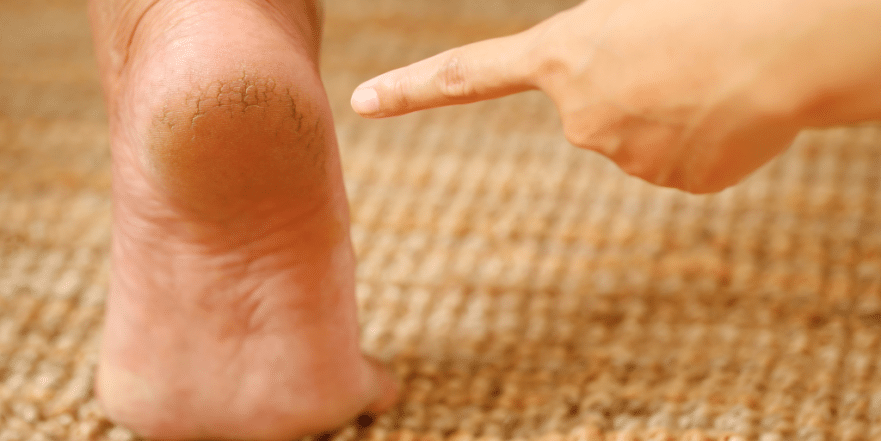
Did you know that your feet might be trying to tell you something crucial about your overall health? It’s true. From perpetually cold toes to nails that seem to break if you just look at them, these subtle signs could be your body’s way of revealing hidden nutrient deficiencies that are impacting your well-being far beyond your feet. So, before you dismiss that nagging foot cramp or cracked heel as a minor annoyance, stay tuned as we uncover the vital secrets your feet are eager to share.
Your feet are the unsung heroes of your body. Think about it—they carry you through life, enduring an estimated 100,000 miles of walking over an average lifetime. Despite this incredible service, they are often the most neglected part of our health and hygiene routines. We squeeze them into ill-fitting shoes, forget to moisturize them, and ignore minor pains, hoping they’ll just go away. This neglect can turn your feet into a breeding ground for issues that go far deeper than cosmetic concerns. By learning to read the signals your feet are sending, you can take proactive steps to address underlying nutritional gaps and significantly boost your overall health. It’s time to start listening to what your body is telling you, starting from the ground up.
Key Takeaways
- Cracked Heels: This common issue isn’t just about dry skin. It can signal a deficiency in essential skin-health nutrients like vitamin C, vitamin E, or omega-3 fatty acids.
- Numbness or Tingling: If you experience a “pins and needles” sensation in your feet, it could point to a lack of B vitamins, specifically B12 and B6, which are critical for nerve health.
- Persistently Cold Feet: While it can have other causes, chronically cold feet are a classic sign of iron deficiency, which impairs circulation and oxygen transport.
- Frequent Foot Cramps: Sudden, painful muscle spasms in your feet often indicate an imbalance or deficiency in key minerals like magnesium, calcium, or potassium.
- Brittle Toenails: If your toenails are weak, dry, and break easily, you might be lacking in biotin or zinc, two nutrients essential for nail structure and growth.
- Swollen or Painful Joints: Aches and pains in the joints of your feet could be a sign of vitamin D deficiency, which is crucial for bone health and inflammation control.
1. Cracked Heels: More Than Just Dry Skin
If the skin on your heels is dry, flaky, and has deep, painful fissures, your first instinct might be to reach for a heavy-duty lotion. While moisturizing is important, persistent cracked heels can be a sign that the problem is internal, not just external. Your skin requires specific nutrients to maintain its elasticity and integrity, and a deficiency can show up right on your feet.
This issue is often linked to a lack of vitamin C, vitamin E, or omega-3 fatty acids. Vitamin C is a powerhouse for your skin because it’s essential for producing collagen, the protein that gives your skin its structure and firmness. Without enough vitamin C, your skin can become fragile and slow to heal. Vitamin E is a potent antioxidant that protects your skin cells from damage, while omega-3 fatty acids help maintain your skin’s natural oil barrier, keeping it hydrated and supple. If your heels are constantly cracked despite your best moisturizing efforts, consider increasing your intake of citrus fruits, bell peppers (for vitamin C), nuts and seeds (for vitamin E), and fatty fish like salmon or flaxseeds (for omega-3s).
2. Numbness or Tingling: When Your Nerves Are Crying Out
Do you ever experience that strange “pins and needles” sensation in your feet, or areas that feel numb for no apparent reason? This phenomenon, known as peripheral neuropathy, can be a serious warning sign that your nerves aren’t getting the support they need. Two of the most important nutrients for nerve health are vitamin B12 and vitamin B6.
Vitamin B12 plays a vital role in creating the myelin sheath, a protective coating that surrounds your nerves and allows them to transmit signals effectively. A deficiency can cause this sheath to break down, leading to the tingling and numbness you feel in your extremities. Vitamin B6 is also crucial, as it helps synthesize neurotransmitters—the chemical messengers that allow your nerves to communicate. A lack of these B vitamins can disrupt this entire communication system. Since vitamin B12 is found almost exclusively in animal products, vegans and vegetarians are at a higher risk of deficiency. To boost your levels, focus on foods like meat, fish, and dairy for B12, and chickpeas, tuna, and salmon for B6.
3. Persistently Cold Feet: Is It Poor Circulation?
Putting on an extra pair of socks in the winter is one thing, but if your feet feel like blocks of ice year-round, it could be a sign of poor circulation. One of the most common nutritional causes of this is an iron deficiency. Iron is a critical component of hemoglobin, the protein in your red blood cells responsible for transporting oxygen from your lungs to the rest of your body, including your feet.
When you’re low on iron (a condition known as anemia), your body can’t produce enough healthy red blood cells to deliver oxygen efficiently. Your body prioritizes sending oxygen to vital organs like your heart and brain, leaving extremities like your hands and feet with less, which causes them to feel cold. To warm things up from the inside out, focus on incorporating iron-rich foods into your diet. These include red meat, poultry, and fish (heme iron, which is easily absorbed) as well as lentils, spinach, and fortified cereals (non-heme iron). A helpful tip: pair plant-based iron sources with a food high in vitamin C, like orange juice or bell peppers, to dramatically increase absorption.
4. Frequent Foot Cramps: Your Muscles Are Asking for Minerals
There’s nothing quite like being jolted awake by a sudden, excruciating cramp in your foot or calf. These involuntary muscle contractions are often a direct result of an electrolyte imbalance. The three key minerals your muscles rely on for proper function are magnesium, calcium, and potassium.
Think of these minerals as a team. Calcium is needed to help your muscles contract, while magnesium is needed to help them relax. If you have too much calcium relative to magnesium, your muscles can get stuck in a state of contraction, leading to cramps and spasms. Potassium works alongside sodium to regulate fluid balance and nerve signals that control muscle contractions. A deficiency in any of these can throw the whole system off-kilter. To prevent these painful interruptions, ensure your diet includes mineral-rich foods like bananas and sweet potatoes (for potassium), yogurt and leafy greens (for calcium), and almonds and avocados (for magnesium).
5. Brittle Toenails: A Clue to Your Keratin Structure
Your toenails, just like your fingernails, are made of a protein called keratin. If they are weak, thin, and seem to chip or break at the slightest provocation, it could be a sign that you’re not getting enough of the building blocks needed for strong nail formation. The two key nutrients to look at here are biotin and zinc.
Biotin, also known as vitamin B7, is famous for its role in supporting healthy hair, skin, and nails. It does this by improving your body’s keratin infrastructure. Studies have shown that biotin supplementation can significantly increase nail thickness and reduce brittleness. Zinc is another crucial player, as it’s essential for the rapid cell growth required to form new, healthy nails. A zinc deficiency can not only cause brittle nails but may also lead to the appearance of white spots on the nail plate. To fortify your nails, make sure you’re eating foods like eggs, nuts, and whole grains for biotin, and beef, pumpkin seeds, and oysters for zinc.
6. Swollen or Painful Joints in Your Feet: Could It Be Vitamin D?
Your feet contain over 30 joints that work together to provide flexibility and absorb shock with every step. If you’re experiencing unexplained aches, stiffness, or swelling in these joints, it might be more than just the result of a long day. A deficiency in vitamin D could be a contributing factor. Vitamin D is often called the “sunshine vitamin” because your body produces it in response to sun exposure.
Its most well-known role is helping your body absorb calcium, making it absolutely essential for strong, healthy bones. Without enough vitamin D, your bones can become soft (a condition called osteomalacia in adults), leading to bone and joint pain. Furthermore, vitamin D has powerful anti-inflammatory properties. A deficiency can lead to increased inflammation throughout the body, which can manifest as painful and swollen joints in your feet. Besides getting sensible sun exposure, you can find vitamin D in fatty fish, fortified milk, and egg yolks. Due to modern indoor lifestyles, many people are deficient and may benefit from consulting a doctor about supplementation.
7. Proactive Foot Care for Overall Wellness
Beyond nutrition, taking direct care of your feet is one of the best investments you can make in your long-term mobility and comfort. Many common and painful foot conditions, like bunions, plantar fasciitis, and ingrown toenails, can often be prevented or managed with simple, consistent habits. Wear supportive, well-fitting shoes that give your toes room to move. Avoid wearing tight, narrow shoes or high heels for extended periods. Maintain good hygiene by washing and drying your feet thoroughly every day to prevent fungal and bacterial infections. Finally, incorporate simple stretches for your toes, ankles, and calves to maintain flexibility and prevent issues like Achilles tendinitis.
Conclusion
Your feet are far more than just a means of getting from one place to another; they are a sophisticated diagnostic panel that reflects your internal health. By paying close attention to the signals they send—from the texture of your skin to the strength of your nails—you can gain valuable insights into potential nutrient deficiencies and take proactive steps to correct them. Remember, a healthy body truly starts from the ground up. So, give your feet the attention and care they deserve. In return, they will continue to support you, not just on your daily journey, but on your path to greater overall wellness. As always, while this information is a great starting point, be sure to consult with your healthcare provider for a proper diagnosis and personalized advice.

